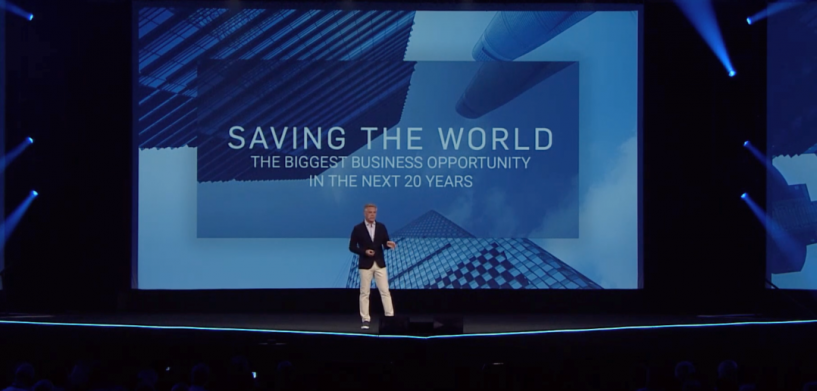Ola Rollén kicked off HxGN LIVE 2019 in style with a clarion call to businesses to use technologies to work towards a sustainable future.
For a keynote with the theme “Can your data save the world?” you know it would be different — very different from traditional Hexagon keynotes. In a world that is drowning in data, the topic couldn’t be more exciting. What added to the excitement is the ongoing discussions around the Digital Revolution and 4IR on one hand, and the Climate Change and Global Warming related debates. And if you had been checking some of the tweets coming from the Hexagon handles in recent times, you could have guessed what was coming. And Ola Rollén didn’t disappoint.
Rollén started off with a soul-searching question: Does the world need saving? And backed it up with facts and figures to state that it is actually mankind that is under threat and needs saving. And not just mankind, a million species on earth are facing extinction due to human influence. Humans have caused a loss of 15% of all fish population, killed 50% of all plants, and killed 80% and 83% of all marine and land mammals, respectively. In 120 years we have cut down 10 million hectares of forest, which is about one-tenth of Canada. Polluted air, microplastics in food and drinking water, population growth are some of the things he touched on to impress upon the audience the gravity of the situation.
Once he had built the background, came the interesting change in track — how data can save the world and how to make a business out of saving the planet. He gave the example of 4Ocean — an inspiring example of such a sustainable business venture. Appalled by the sheer amount of plastic in the South Pacific, 4Ocean has removed over 4.7 million pounds of trash from beaches and coastlines since 2017. While 4Ocean is a commendable business initiative in itself, “where industries can take the lead is what if we removed all this plastic and used it in construction industries? What if we used all this plastic to pave roads? You can even feed the power plants instead of dumping it all into the ocean.” Rollén wondered.
Everyone knows CO2 emissions are causing immense damage to the ozone layer. The world generates 36 billion metric tonnes of CO2 each year, which is going to double in the next 20 years. The biggest contributor in this is energy and agriculture, with industries, transportation and buildings bringing up the rear, Rollén stated.
It’s a no-brainer that reduction in waste and improving efficiencies could reduce carbon emissions. “A staggering 68% of energy produced in the US goes to waste every year. That’s like powering th eUK for seven years,” Rollén underlined, as he finally switched to the much-awaited part of his presentation – how Hexagon will address these challenges with its innovations and technologies.
He laid out Hexagon’s solutions and vision for putting data to work in organisations to reverse the trend of resource depletion, explaining again, with carefully compiled facts and figures, how higher productivity and quality outcomes will drive sustainability and growth for our businesses as well as the planet. He gave examples of how Hexagon has been working with Formula One to increase the combustion power of engines and cut waste; precision agriculture (a combination of geospatial and mapping technologies, positioning and autonomous technologies) can increase output with less waste and pollution; reducing yield loss in the industrial sector (which has around 40% productivity) by using data scientifically could increase profitability and also reduce CO2 emissions.
“Hexagon has a far-reaching vision for putting data to work to reverse the trend of resource depletion and waste overwhelming Earth’s systems,” said Rollén. “By empowering an increasingly autonomous future, our ‘do well to do good’ approach will drive sustainability through efficiency gains, increased safety, improved productivity and less waste — the very business outcomes our customers seek,” he said.
“Businesses that will transform themselves to scale up and do business sustainably by using data will be the winners in the times to come,” he said. Of the 100 largest polluters in the world, 29 are countries and 71 are companies and corporation. “There is no conflict between making money, adding to shareholder value and saving the planet. There needs to be a balance. Saving the planet needs to be an industrial movement,” he added.
Rollén concluded, “We have 30 years to fix this problem and we have to take the initiative and sort this out. It’s your data which can save the world, but only if you put it to work.” The message couldn’t have come at a better time.

















